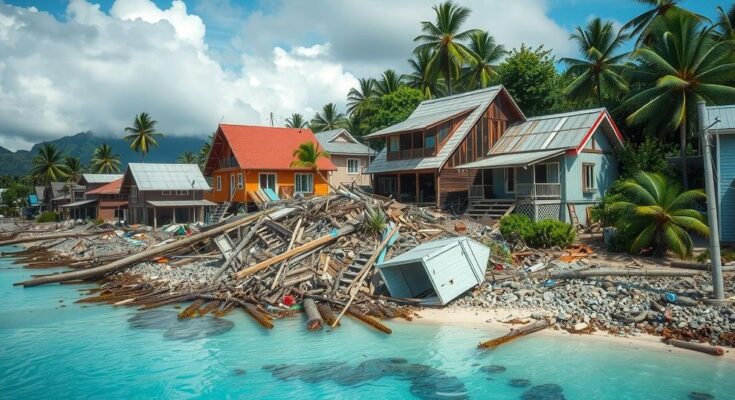Tropical Cyclone Chido severely impacted Mayotte, Comoros, and Mozambique, resulting in extensive damage and loss of life. Simultaneously, a 7.3-magnitude earthquake struck Vanuatu, worsening the humanitarian crisis. Direct Relief is mobilizing resources to assist affected communities, focusing on healthcare needs and the prevention of long-term health issues following these natural disasters.
Over the weekend, Tropical Cyclone Chido unleashed its fury upon the Mayotte archipelago, Comoros, and Mozambique, leading to catastrophic destruction and loss of life. This disaster was exacerbated just days later when a 7.3-magnitude earthquake struck Vanuatu, compounding the hardship faced by communities already vulnerable to natural calamities. Cyclone Chido has been heralded as the most powerful storm to impact Mayotte in over nine decades, featuring winds surpassing 140 miles per hour and storm surges reaching 28 feet. Entire neighborhoods, particularly those housing undocumented migrants, were obliterated. As of now, the death toll stands at 22, yet casualty forecasts indicate that this number may rise into the thousands as further assessments are conducted.
In Comoros, Cyclone Chido also wrought considerable destruction, leading President Azali Assoumani to declare a week of mourning for the lives lost. Many infrastructures were reported damaged extensively. Mozambique, already susceptible to adverse weather conditions, encountered Chido’s full might, with winds exceeding 160 miles per hour causing significant damage to homes, infrastructure, and healthcare facilities across Cabo Delgado province.
Organizations such as Direct Relief are mobilizing resources to assess and respond to the needs of the impacted communities. In Mayotte, Direct Relief is collaborating with French emergency response agencies to meet immediate healthcare needs. In Comoros, partnerships with Santé Diabète are facilitating the evaluation of the situation to provide support. Outreach efforts continue with Mozambique’s Ministry of Health to supply emergency medical resources.
Simultaneously, Vanuatu experienced a considerable setback when a powerful earthquake, registering a magnitude of 7.3, occurred. Initial reports suggest widespread destruction affecting homes and public infrastructure, especially healthcare facilities, with subsequent aftershocks still posing threats. Direct Relief is working with healthcare partners in Vanuatu to identify urgent requirements, with a shipment of emergency medical supplies already en route.
Natural disasters such as cyclones and earthquakes inherently threaten human health. The immediate consequences typically include mass casualties, traumatic injuries, and the collapse of healthcare systems, which can overwhelm localized responses. Long-term repercussions may involve increased risks of disease outbreaks stemming from contaminated water supplies, heightened displacement in overcrowded shelters, and interruptions in chronic health care, particularly for vulnerable groups, including pregnant women and infants.
Direct Relief remains committed to distributing essential medical supplies to healthcare providers amid these crises. Their extensive history of aiding disaster-stricken regions underscores their vital role in ensuring communities receive timely and adequate medical assistance after devastating events. Previous interventions in Mozambique, Vanuatu, Turkey, Syria, Nepal, Haiti, and the Philippines reveal a consistent pattern: Direct Relief’s capability to deliver substantial medical aid post-disaster, reflective of their overarching mission to fortify healthcare systems and ensure community resilience.
As the situation surrounding Cyclone Chido and the Vanuatu earthquake evolves, Direct Relief’s focus remains steadfast: to support healthcare providers and facilitate recovery efforts, thereby ensuring life-saving medical care reaches those in dire need.
Recent events have underscored the significant challenges posed by natural disasters, particularly in regions with existing vulnerabilities. The devastation caused by Cyclone Chido over the weekend and its subsequent impact across multiple nations exemplifies the destructive power of tropical storms. Coupled with the earthquake in Vanuatu, these events underline an urgent need for humanitarian response which includes healthcare support. The regional implications of these disasters highlight the necessity for organizations such as Direct Relief to mobilize resources and assist affected populations. This context is vital for understanding the comprehensive strategies required to mitigate the long-term health risks posed by such calamities.
In summary, Tropical Cyclone Chido and the earthquake in Vanuatu have manifested severe repercussions for the affected populations, with Direct Relief actively engaging in disaster response efforts. The organization’s history of effective emergency medical aid during similar disasters reinforces the necessity of timely support for healthcare systems. As these communities grapple with immediate challenges and long-term health risks, it is imperative that resources continue to flow to those in greatest need, ensuring comprehensive care and recovery support in the aftermath of calamity.
Original Source: www.directrelief.org




